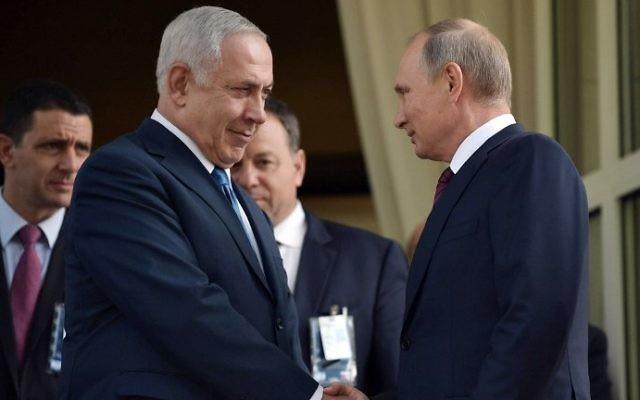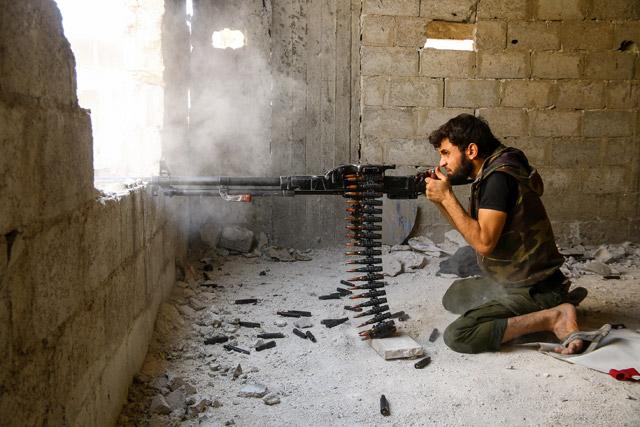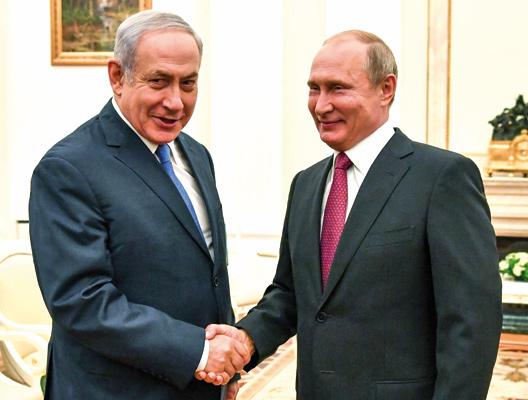You are here
Russia to deploy military police on Golan Heights
By Reuters - Aug 02,2018 - Last updated at Aug 02,2018

Russian President Vladimir Putin (right) shakes hands with Prime Minister Benjamin Netanyahu during their meeting in Sochi on August 23, 2017 (AFP photo)
MOSCOW — Russia will deploy its military police on the Golan Heights frontier between Syria and Israel, its defence ministry said on Thursday, after weeks of mounting volatility in the area.
Syrian President Bashar Assad's sweeping away of rebels in southwestern Syria has worried Israel, which believes it could allow his Iranian backers to entrench their troops close to the frontier.
Underlining the tensions, Israel killed seven militants in an overnight air strike on the Syrian-held part of the Golan Heights, Israeli radio said on Thursday.
Sergei Rudskoi, a senior Russian defence ministry official, said that Russian military police had on Thursday begun patrolling in the Golan Heights and planned to set up eight observation posts in the area.
He said the Russian presence there was in support of United Nations peacekeepers on the Golan Heights who, he said, had suspended their activities in the area in 2012 because their safety was endangered.
"Today, UN peacekeepers accompanied by Russian military police conducted their first patrols in six years in the separation zone," Rudskoi told a briefing for journalists in Moscow.
"With the aim of preventing possible provocations against UN posts along the 'Bravo' line, the deployment is planned of eight observation posts of Russia's armed forces' military police," Rudskoi said.
He said the Russian presence there was temporary, and that the observation posts would be handed over to Syrian government forces once the situation stabilised.
The deployment of the Russian military police highlights the degree to which the Kremlin has become an influential actor in Middle East conflicts since its military intervention in Syria, which turned the tide of the war in Assad's favour.
Israel has been lobbying the Kremlin to use its influence with Assad, and with Tehran, to try to get the Iranian military presence in Syria scaled back.
Israel sees Iran, and Iran's allies in the Hizbollah Shiite military, as a direct threat to its national security.
That message was conveyed by Israeli Prime Minister Benjamin Netanyahu to Russian President Vladimir Putin when they met in Moscow last month, a senior Israeli official said.
Iranian forces have withdrawn their heavy weapons in Syria to a distance of 85 km from the Israeli-occupied Golan Heights, TASS quoted a Russian envoy as saying on Wednesday, but Israel deemed the pullback inadequate.
Related Articles
MOSCOW — Russia has deployed military police to monitor two safe zones being established in Syria, it was announced on Monday, with official
GOLAN HEIGHTS — Near an abandoned United Nations observation point whose wall had been riddled with bullets, Syrian and Russian policemen ga
OCCUPIED JERUSALEM/MOSCOW — Israeli Prime Minister Benjamin Netanyahu told Russia on Wednesday that Israel would not seek to topple its ally


















